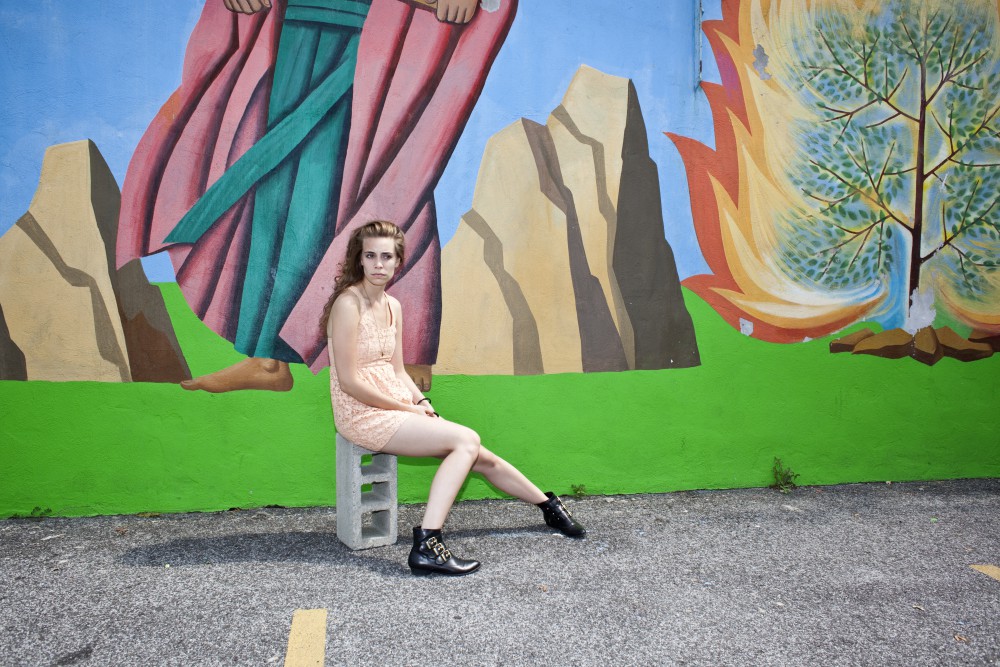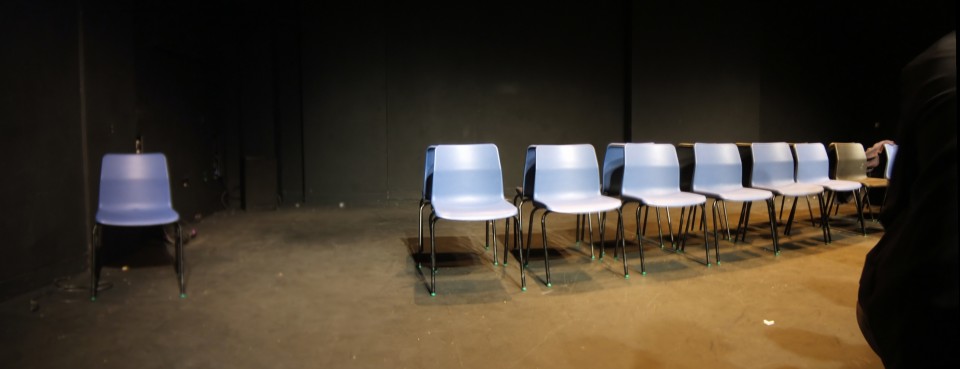When I was very young I used to spend hours pretending to be a dog—crawling around on my hands and knees, licking my paws, and wearing a pink studded collar. I even got my little brother to sneak cereal from the kitchen so I could eat it out of a bowl on the ground. I imagined myself playing out a movie about a dog—therefore this performance was only useful for me when company was over, much to my mother’s eye-rolling chagrin. Once in a while, when someone who was visiting for tea or for a birthday party at my house was nice, they played along and called me by my preferred dog name: Peaches. Those were the times I delighted in this endeavor. My mother tells me now that she never understood why I would embarrass myself in front of company for such extended periods of time—most children play pretend when they are alone in their room or in the backyard. But I thought of it as a performance; it had to have an audience and they had to react to my tricks or it wasn’t fun.
Someone once told me that you are only a real writer if you know that you would have to keep writing if you were the only person left on this planet. This sentiment has always made me second-guess myself, but I think ultimately that it’s ok that I would stop producing art if I was the only one here. I wouldn’t have anyone to talk to about the things I make or write or act. I wouldn’t be able to ask questions, to be told that I should change this or that. The art I make always has to be set in the context of a conversation for me to be fulfilled by it.
When I began to write a novel in sixth grade, (which I deemed Emerald Sands: the Merelhon Articles) it was because my best friend Larisa had begun to write a novel herself. We would print out five pages of manuscript at the library and trade between classes, marking up each other’s copies with gel pens. We would search for inspiration together, in magazines we would clip out pictures of outfits we wanted our characters to wear, or we would watch fantasy movies and jot down ideas for our plots. I would sit in my room after school for hours, writing on my 1995 IBM computer with a candle burning and a nature sounds CD playing in the background. When Larisa abandoned her project, I handed my manuscript to an old English teacher who I had loved. She never got back to me with any edits (I’m sure she was a busy lady), and so I dropped the project. The conversation had ended. The flow of water from the tap had stopped. I didn’t want to write for myself—I wanted to write for the experience of writing together with Larisa. The manuscript still sits on a floppy disk at my mom’s house.
When I got to high school, I met my first real mentor: my twelfth grade English teacher, Mr. Bernstein. He was a quiet man who wrote poetry after Kerouac and would solicit my opinion during class by responding to my facial expressions during discussions: “Kristen, you don’t seem to like that idea. Will you explain for us?” Mr. Bernstein became the reason I started to write poetry when he asked me to take his class. I competed in slam competitions that year and won a few of them, all while Mr. Bernstein looked on, having driven us to the cafes in his slightly rusted Pontiac. When I entered college at SUNY Oneonta, I fell quickly into the Poetry Slam Association and the team. For the next three years, I held the office of president for the Poetry Slam Association and reaped the benefits of a burgeoning, verdant poetry community. We would write together, revise together and, every Friday, we would party together. I was a fully realized artist then. I identified my friends as “poets.” “The poets are coming over tonight,” I would say. People laughed but that was the most potent time for me as an artist. I met a boy who wrote poetry too and we fell in love. We made the team together. We wrote poetry together. We read it to each other. My audience was everywhere, and they spoke the same language I did. The company I surrounded myself with created a greenhouse effect that bred cacophonic heat and creativity. The competitions didn’t fuel me. I didn’t submit my poetry to magazines for publication; I just read it on the front porch Friday night and at weekly Poetry Slam Association meetings. The poets would suggest changes or edits and would tell me they liked it. I would be satisfied. I just wanted the community to come together and know that I was an artist. I wanted them to listen to me, but I also wanted to listen to them. I didn’t have to venture outside that bubble during my undergrad years, and I didn’t really. Identifying myself as an artist in undergrad meant identifying myself with people who hung out and created together.
After four fervent years, I graduated from Oneonta and moved on to a larger greenhouse of artistic mire: New York. My growth here as an artist took a turn I didn’t expect. Although New York is home to one of the largest poetry slam communities in the country, I didn’t fall into that neighborhood. Here, instead, I found an instant kinship with theatre artists who wanted to work together to create and produce plays. We began to work together to produce plays we have a passion for and created a small company with non-profit status. I act and direct with this company, and I have never been closer to calling myself a “professional” artist than now. It’s a lot of work—but we are friends first and company members second, so I find myself staying satisfied and creative. There is less booze, less dancing and more transfers of money between business bank accounts. There is less banter and more meeting agendas. How does a college-aged artist transition from the late-night world of inspiration and booze and a togetherness that breeds poetry and creativity, to a more consistent existence that includes a job and rent and responsibility? What do you gain and what do you lose? For me, I lost the urgency of my art, my writing in particular, but in turn I gained the will to toil—to work harder and longer on one piece, one role, or the analysis of one play, for instance. To accept the full responsibility of being an artist is to accept that creativity shifts and changes, even within oneself. For years I’ve grappled with the willingness to really revise a piece—whether I am acting or writing or directing. But now that I have more patience, I am beginning to really see the merit in such efforts. It is easy to be driven when you are inspired. It is easy to run with the flow and accept it when you have a brilliant idea that just comes into your head. It’s harder to mine in the darkness for the diamonds you don’t even know are there, to sit at a computer and rework your words, or to stand in front of a mirror and rehearse your monologue without someone telling you that you’re doing a good job constantly. You are more of a public servant. You are a worker bee who is willing to fill the honeycomb even if it is taken away every time by a large figure in a stark white suit.
I would quickly tell any artist who wants to translate their art into money that if art is the expression of an idea, your money will be all over your art. Rather, if you make art because you love the people you make it with, then those people will be all over your art—and thus your art is a communication of ideas to your fellow community members, to people you surround yourself with; it stays relevant and necessary. The shifts I have taken as an artist were all because of this question of relevance. I have seen plays produced for no one: plays that were cast, rehearsed, and put up with no awareness of who their audience is, what they can pay for, and what they need to see. Those plays often have empty houses on opening night, or the purpose of the play is lost. For instance, if a theatre company produces Arthur Miller’s Death of a Salesman, a play that at its core is about the failure of the American Dream and the middle class, and sells tickets for all over 100 dollars, something is missed. Who is your audience?
I think that as humans we like when artists do the work for us—when they search through the primordial ooze of the earth and bring us back a bushel of connections that were nestled in places we never would have thought to look for whatever reason. The artist is a translator of the great truths we have to deal with because we are humans and we are conscious of our existence—the artists make it easier for the rest of us. But what do the artists need? I think they are always looking for affirmation that they have found a crevice in the great cave. They are so far in that the rope is taut and they’ve run out of batteries for the flashlight. So they shout, “I found something!” And they stand there, waiting for the echo of the great crowd that has collected at the mouth of the cave: “Sounds great! Show it to us! We want to see it!”

Kristen Tomanocy is a feminist who loves talking about Aristotle’s 6 elements of tragedy and sampling different types of scotch. Her poetry is featured in Static and Other Lungless Things, a Penmanship Press book featuring The Intangible Collective. In 2009 Kristen was the first ever female to become the SUNY Oneonta Grand Slam Champion. She was the President of the SUNY Oneonta Poetry Slam Association from 2008-2011 and represented the SUNY Oneonta Poetry Slam Team four times. She directed Sam Shepard’s Fool for Love in August, 2012 alongside Wombat Theatre Co. She has played Macbeth, Charlotte in Beyond Therapy, and the Courtesan in The Comedy of Errors. Kristen is now living in Brooklyn, New York, where she received her Master of Arts in English and Theatre Education at New York University this spring. This summer she will be directing Edmond Rostand’s Cyrano de Bergerac as an environmental, cabaret-style production. She would love to see you there.






